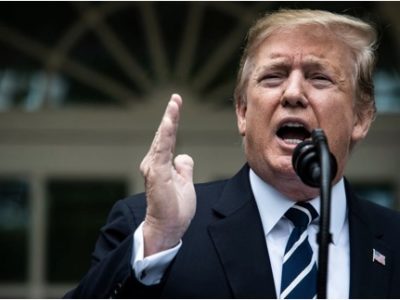The Impoundment Gambit
Legal Planet: Environmental Law and Policy 2024-08-01

One of Trump’s plans for a new presidency is to “use the president’s long-recognized Impoundment power to squeeze the bloated federal bureaucracy for massive savings.” Refusing to spend money that Congress has appropriated is, he says, an inherent presidential power. “Bringing back Impoundment will give us a crucial tool with which to obliterate the Deep State.”
Among the targets being discussed are green energy spending and support for the World Health Organization. Trump has also talked about eliminating environmental agencies, although this might not involve impoundment. Still, when you remember that he repeatedly asked Congress to cut EPA’s budget by $2 billion and to eliminate renewable energy programs in the Department of Energy, it’s pretty clear where this is likely to be heading.
The last president who claimed the power to cancel Congress’s spending priorities was Richard Nixon. Nixon used impoundment to impose, a moratorium was imposed on subsidized housing programs, suspend community development activities, cut disaster aid, and eliminate several farm programs. The most dramatic action involved the Clean Water Act, which contained $24 billion in funding to improve municipal sewage treatment. Nixon vetoed the legislation because he opposed this spending. After Congress overrode his veto, he impounded half the funds. Congress responded by passing the Impoundment Control Act, which tightly limits the president’s power to underspend appropriations. In Train v. City of New York, the Supreme Court overturned Nixon’s impoundment based on the new statute.
According to Trump, “this disaster of a law is clearly unconstitutional—a blatant violation of the separation of power.” Trump points to a history of presidents impounding funds for managerial reasons as a justification for a sweeping power to rewrite the federal budget. For instance, if Congress appropriates a million dollars to construct a building, the president doesn’t need to spend the whole amount if it turns out that construction costs less than expected. That’s presumably consistent with congressional intent.
It’s quite different to say, as Trump does, that the president can simply cancel the building project if he doesn’t like it. That would be similar to the line-item veto power that some state governors have, which allows them to cut appropriations out of bills that come to their desks. The U.S. Constitution does not give the president a line-item veto, as the Supreme Court has made abundantly clear.
What Trump proposes would give the president unprecedented power. For instance, although Trump disclaims any intent to do so, he would have the power to slash social security with a single stroke his pen, and there would be nothing Congress could do about it.
The radicalism of this proposal is no accident. His chief advisor on these issues is avowed Christian nationalist Russ Vought,. Vought makes no bones about his desire to rewrite the constitutional order. “We are living in a post-Constitutional time,” he says. He calls for “envisioning, articulating, and defending what a Radical Constitutionalism requires in the late our that our country finds itself in.” This is apparently music to Trump’s ears: he has made Vought the chief policy officer in charge of the 2024 GOP platform. The impoundment gambit is only one part of this plan to eliminate our system’s checks and balances.